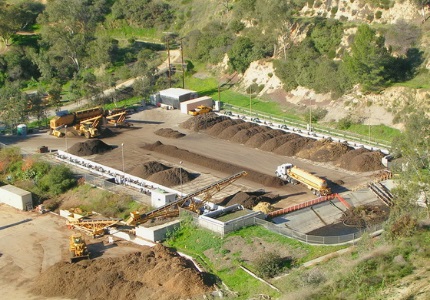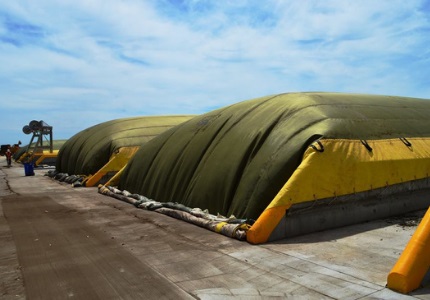Capacity Planning for Organic Waste Recycling
SB 1383 requires jurisdictions to implement mandatory organic waste collection and recycling in a statewide effort to divert organic waste from landfills. To help achieve this goal, the law requires jurisdictions to assess their current organics recycling capacity and plan to expand it if needed.
Jurisdictions are required to evaluate their capacity and plan to expand it if needed.
Counties are required to report capacity planning estimates to CalRecycle.
The reported estimates can be found on the SB 1383 Capacity Planning Data by County webpage.
Capacity Planning Requirements
California counties that provide solid waste collection services must plan for adequate capacity for recycling organic waste.
Each county is responsible for leading this collaborative effort among all cities, regional agencies, and special districts that provide solid waste collection services within the county.
Note: In the context of capacity planning, the term jurisdiction collectively refers to counties, cities, regional agencies, and special districts that provide solid waste collection services.
Each county is responsible for:
- Collecting organic waste recycling capacity information from jurisdictions.
- Identifying any jurisdiction that does not have enough capacity, including itself.
- Submitting an organic waste recycling capacity report to CalRecycle on the following schedule:
- By August 1, 2024, counties shall report on the period covering January 1, 2025, through December 31, 2034. (10-year period)
- By August 1, 2029, counties shall report on the period covering January 1, 2030, through December 31, 2039. (10-year period)
- By August 1, 2034, counties shall report on the period covering January 1, 2035, through December 31, 2044. (10-year period)
- Every five years starting in 2029
- Informing jurisdictions that have insufficient capacity that they must submit an implementation schedule to CalRecycle.
Each jurisdiction is responsible for:
- Estimating the amount of organic waste in tons that will be disposed of.
- Organic waste must include:
- Food scraps
- Landscape and pruning waste
- Wood
- Paper products
- Digestate and
- Biosolids.
- Organic waste must include:
- Identifying the amount of existing organic waste recycling infrastructure capacity, in tons:
- Located both in the county and outside of the county
- Verifiably available to the jurisdiction demonstrated by a:
-
- Contract
- Franchise agreement or
- Other documentation.
-
- A facility permit is not an indication of capacity available.
- Estimating the amount of new or expanded capacity needed to process the organic waste estimated to be disposed of.
- Responding to the county’s request for necessary capacity planning information within 120 days.

Exemptions with Department-Issued Waivers
Jurisdictions exempt from organic waste collection requirements are not required to include capacity plans (see Section 18992.3).
Waiver-exempt jurisdictions (see Section 18984.12), are not required to:
- Conduct the capacity planning required (see Section 18992.1)
- Include organic waste capacity planning data in the report submitted by the county if they continue to have a waiver.
A county is not required to obtain information from a waived jurisdiction, and may subtract the waste generated in an area subject to a waiver for capacity planning purposes.
Low Population Waivers
Jurisdictions with a rural exemption or low population waiver were not required to conduct capacity planning for organic waste recycling.
- Jurisdictions will need to reassess whether they will be eligible for the low population waiver.
- If eligible, they should apply in late 2026 to be in place by Jan. 1, 2027.
- If not eligible, they must work with CalRecycle on plans to implement the organic waste collection requirements, which must start Jan. 1, 2027.
- Starting in 2027, jurisdictions without a waiver will be required to complete capacity planning on the scheduled timeline for the next 2029 capacity planning report.
The Final Statement of Reasons clarifies subsequent reporting periods. The laws state that exempt jurisdictions do not have to do capacity planning.
Implementation Schedule
Jurisdictions that have not identified enough existing or new organic waste recycling capacity must submit an implementation schedule to CalRecycle that must include timelines and milestones for planning capacity, including:
- Getting funding for organic waste recycling infrastructure, such as through modifying franchise agreements or other means of financially supporting the expansion of organic waste recycling.
- Identifying facilities, operations, and activities that could be expanded to recycle additional organic waste.


Capacity Planning is a Collaborative Effort
During the capacity planning process, the county, in coordination with jurisdictions and regional agencies, must work together to consult with the following entities:
Enforcement Agency and Local Task Force
This consultation provides the status and locations for new and expanding solid waste facilities, including potential capacity increases, and the planned closure of solid waste facilities.
Haulers and Owners of Facilities, Operations, and Activities that Recover Organic Waste
This consultation will help facilitate conversations between jurisdictions, haulers, and facilities to identify opportunities for securing feedstock agreements.
This will also help ensure that jurisdictions are receiving information from businesses and other local entities that may control the operational infrastructure needed to recycle organic waste and sufficiently plan for additional infrastructure.
These entities must respond to the jurisdiction within 60 days.
Community Composting Operations
This consultation will help determine whether small-scale community composting operators may be able to recycle additional organic waste outside of conventional organic waste processing infrastructure.
This will also help ensure that jurisdictions involve local communities in their organic waste recycling capacity planning efforts.
Entities that are contacted by the county, city, regional agency, or special district that provide solid waste collection services must respond within 60 days. This will support counties and jurisdictions in meeting their capacity planning requirements within the regulatory timeframes.
For more information contact: Short-Lived Climate Pollutants (SLCP), Organic Waste Methane Emissions Reductions, SLCP.organics@calrecycle.ca.gov
